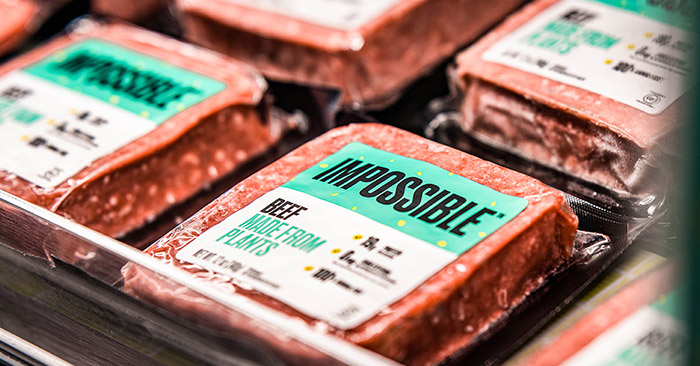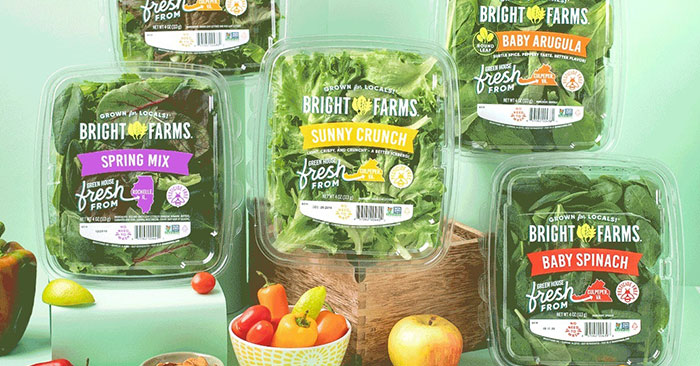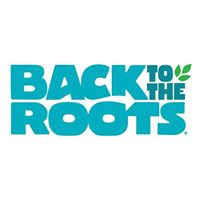The Checkout: Impossible Foods, Eat Just Expand in Asia; True Made Foods Strikes Red Sox Deal
Welcome to The Checkout: an express lane for the weekly news you need to know, always 10 items or less.

Impossible Foods and Eat Just Expand in Asian Market, Preview New Innovations
Plant-based meat company Impossible Foods launched its flagship product line Impossible Beef into 200 grocery stores and online in Hong Kong and Singapore this week. The launch marks the product’s first retail placement outside of the U.S. Impossible Beef is already available in over 1,200 restaurants across Asia, with sales in that market increasing sixfold last year, according to the company.
The company also announced this week that it plans to double its R&D team in Silicon Valley over the next year, launching a program called “Impossible Investigator” to recruit scientists to establish new research programs to develop new plant-based meat, fish and dairy products. During a virtual news conference on Tuesday, the company debuted an early prototype for its latest innovation: Impossible Milk. During the call, Laura Kliman, senior flavor scientist at Impossible, showcased the new product, demonstrating it being heated and mixed into coffee, according to CNN. The plant-based milk prototype, like its ground meat products, contains soy.
Elsewhere, plant-based egg maker Eat Just announced the launch of a new Asian subsidiary, Eat Just Asia, through a new partnership with Proterra Investment Partners Asia. As part of the agreement, Eat Just will build its first factory in Singapore, with $100 million invested by Proterra and Eat Just contributing up to $20 million.
The new subsidiary, Eat Just Asia, will manufacture and distribute JUST Egg on the continent. According to a press release, Eat Just and Proterra Asia are also “in discussions” to expand their partnership to Eat Just’s cultured meat products, currently still in development, which they believe can “help create a safer, more secure global food supply.”
True Made Foods Signs Deal With Fenway Park
Low sugar condiment maker True Made Foods has struck a deal with the Boston Red Sox as the exclusive condiment supplier for Fenway Park. The company signed a three-year contract, and the partnership will begin with the 2021 baseball season, according to Washington Business Journal.
True Made Foods, which recently invested in food service-specific offerings such as sachets and pumps, initially secured the deal before COVID-19 hit. However, negotiations were extended in order to add clauses concerning the pandemic, including contingencies for the park having limited capacity or cutting foodservice, CEO Abe Kamarck told the publication.
“The only risk right now that we know of is, we’re totally freaked out not knowing what’s going to happen next year with Covid, and knowing what’s going to happen and when it’s going to happen,” Kamarck said. “It’s obviously going to come back at some point, and we need to be ready for that. But how much money do we invest and risk waiting for it to come back?”
Though financial terms of the deal were not disclosed, Karmarck said a typical full season at Fenway could potentially produce $500,000 in revenue for the company. True Made Foods also aims to expand its foodservice business to colleges, corporate accounts, stadiums and possibly additional sports teams next year. Other condiment brands, such as Sir Kensington’s and Tessemae’s, have also utilized the foodservice channel to extend their reach.
Kamarck told the publication that the company plans to raise at least $3 million in funding next year as it rolls out its first mustard product as well as two new barbecue sauces.

Aleph Farms Aims to Grow Meat in Space With New Program
Taking food security to new heights, Israel-based food tech startup Aleph Farms announced the launch of its Aleph Zero program, aimed at advancing capabilities for quality meat cultivation in harsh climates — like space.
The launch of Aleph Zero comes a year after the cultured meat company successfully produced meat on the International Space Station under microgravity. The company said it will now leverage that experience to form partnerships with tech companies and space agencies, with the goal of establishing “BioFarms” in extraterrestrial environments. Long term, Aleph Farms hopes to eventually apply its learnings from space towards advancing food security on Earth.
“The constraints imposed by deep-space-exploration — the cold, thin environment and the circular approach — force us to tighten the efficiency of our meat production process to much higher sustainability standards,” Aleph Farms co-founder and CEO Didier Toubia said in a press release. “When people will live on the Moon or Mars, Aleph Farms will be there as well.”
Aleph Farms aims to begin pilot production of its meat products and start construction on its first BioFarm in 2021, with its pilot commercial launch set for the end of 2022.

BrightFarms Closes $100M Series E Round
Looking to expand its retail distribution and network of farms, indoor agriculture company and salad green producer BrightFarms raised over $100 million in a Series E round this week. The round was led by Cox Enterprises, which has now taken a majority stake in the company, and also includes follow-on investment from Catalyst Investors. The deal brings the company’s total funding to date to over $200 million.
BrightFarms’ hydroponic greenhouse farms, which use 80% less water, 90% less land and 95% less shipping than traditional agriculture, are located in Illinois, Ohio, Pennsylvania and Virginia, with new farms in North Carolina, Massachusetts and Texas currently in development. The brand’s salad greens are currently sold at over 2,000 retailers including Kroger and Walmart, with a goal to expand to 15,000 retailers by 2025.
“Our goal over the next five years is to make quality, locally-grown greens a staple on grocery shelves and in refrigerators nationwide,” BrightFarms CEO Steve Platt said in a press release. “We are ready to scale our model for local indoor farming in every major market in the U.S.”
Back to the Roots Raises New Round of Financing
Organic gardening company (and former food producer) Back to the Roots announced this week it has closed a new round of financing. The round was led by S2G Ventures and Acre Venture Partners, both previous investors, along with previous investor Once Upon a Farm co-founder and CEO John Foraker and Bay Area investment firm Fund Good Jobs.
The funding follows a $3 million Series C round announced in February 2019. The brand, which launched a line of organic cereals in 2015, signed a licensing deal with Nature’s Path in 2018 to handle production, sales and distribution of that line and has since shifted focus to its seed packets and grow kit products.
“We are building the garden brand for a new generation and we’re grateful for our investor’s continued support as we work to bring our products and mission into every home and classroom in the country,” co-founder and co-CEO Nikhil Arora said.
This round will help further build out distribution and marketing for the company’s new seed packet line. Earlier this Spring, Back to the Roots ran a pilot launch of the line — with 92 U.S. grown varieties of fruit, vegetables, herbs and flowers sold at 100 Home Depot stores. The brand said distribution of the seeds will expand to Home Depot, Albertsons and H-E-B next spring.
















